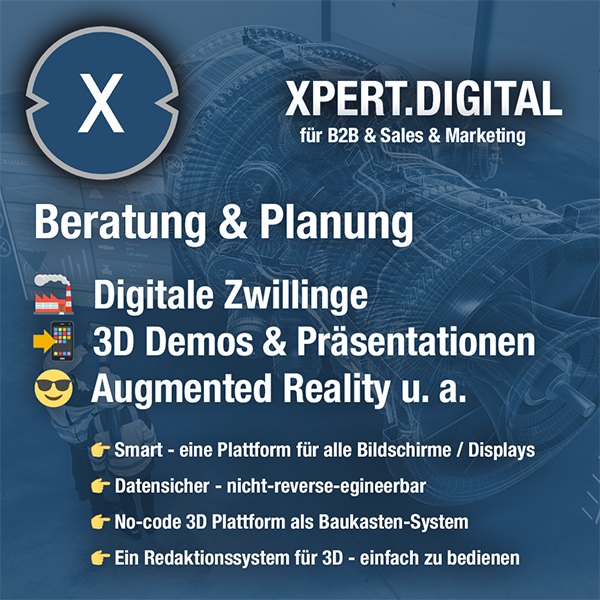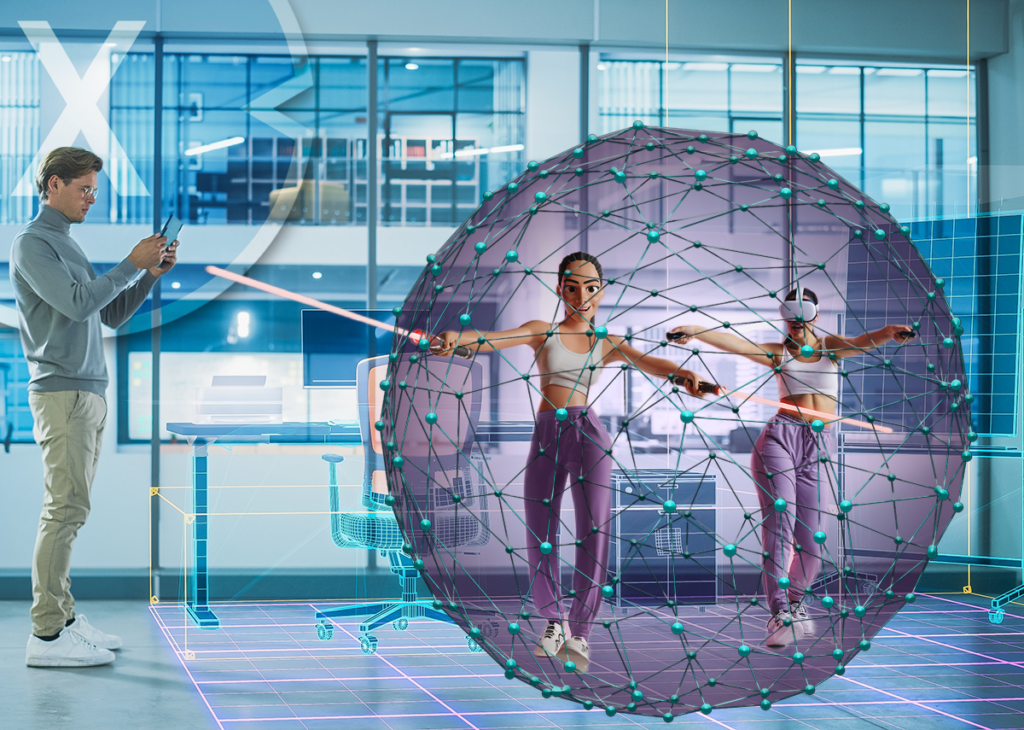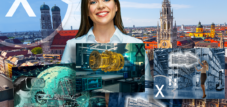Germany is great here: 'iteration metavers' solutions with XR technologies such as extended, augmented, virtual and mixed reality
Language selection 📢
Published on: October 25, 2023 / update from: October 25, 2023 - Author: Konrad Wolfenstein

Germany is the leader here: Iterative Metaverse solutions with XR technologies – Image: Xpert.Digital
📖 🌐 🔍 Introduction to iterative metaverse solutions
An iterative metaverse solution is an approach to developing and improving metaverse technologies through incremental iterations and adjustments. This approach involves deriving smaller, efficient solutions from large metaverse visions that build on the experiences and insights from earlier development phases. The focus is on making continuous improvements and adapting technologies to changing requirements.
🇩🇪 German XR technology industry and iterative metaverse solutions
In Germany, the XR technology industry takes a leading position in the area of iterative metaverse solutions. With the use of augmented reality (XR) technologies, which include extended reality (XR), augmented reality (AR), virtual reality (VR) and mixed reality (MR), the country has taken a big leap forward in its technology sector brought. The applications of these technologies are diverse and include, among others, virtual trade fairs, showrooms and 3D product presentations. What is interesting is the use of no-code 3D platforms that offer similar functionality to existing content management systems, for example WordPress.
🌐 Examples of areas of application and potential
1. Virtual trade fairs
The traditional trade fair visit is being replaced or expanded by virtual reality solutions. This offers the opportunity to design interactive exhibition stands and thus offer visitors an immersive experience. Participants can join from anywhere in the world, increasing both reach and accessibility.
2. Virtual showrooms
Especially in retail and the automotive industry, customers can experience products in a virtual environment. This allows for deeper product interaction without having to be physically present.
3. 3D product presentations
Displaying products in 3D offers significant added value in marketing. Customers can view products from different angles and even test them in a virtual environment.
4. Education and training
VR and AR can also be used in educational institutions and for professional training. This makes complex issues and processes easier to understand.
5. Medicine and healthcare
XR technologies are already used in surgery, diagnosis and therapy. They offer tremendous opportunities for telemedicine and can be helpful in training medical staff.
🖥️ No-code 3D platforms
The importance of no-code 3D platforms cannot be overemphasized. These platforms make it easy for people without a technical background to create complex 3D environments. The interface and functionality are similar to content management systems like WordPress, making it easier to get started. The possibilities for customization and customization are almost endless, from incorporating real-time data to using artificial intelligence.
🤔 Ethics and data protection
As with any technology, there are ethical and privacy considerations. It is important that user privacy is protected and the ethical implications are considered, particularly in the area of artificial intelligence and data collection.
🚀 At the forefront of developing iterative metaverse solutions
Germany is at the forefront of the development and application of XR technologies and iterative metaverse solutions. With a wide range of possible applications from virtual trade fairs to medical simulations, the country offers a wide range of innovative solutions. Through the use of no-code 3D platforms, the creation of these complex digital worlds is becoming increasingly accessible. But as with all technological advances, ethical and privacy issues must also be considered to ensure that the technology is used for the benefit of all.
📣 Similar topics
- 🌐 The future of the Metaverse: Iterative solution approaches in Germany
- 🚀 XR technologies in the technology industry: A look at Germany
- 🌍 Virtual realities: areas of application and potential in Germany
- 🛍️ Virtual shopping experiences: showrooms of the future
- 📦 3D Product Presentations: Innovative Marketing in the Metaverse Era
- 🎓 Education and training in XR: New ways to impart knowledge
- ⚕️ XR in Healthcare: Revolutionary Applications and Opportunities
- 💻 No-Code 3D Platforms: Democratizing Metaverse Development
- 🤖 Metaverse Ethics: Privacy and Ethical Considerations
- 🇩🇪 Germany leads the Metaverse revolution: XR technologies and more
#️⃣ Hashtags: #Metaverse #XR #Innovation #NoCode #Ethics
📖 🌐 Iterative Metaverse solutions - 'Small' Metaverse solutions in Germany are on the rise

Iterative meta -verse solutions - 'Small' meta -verse solutions in Germany are on the rise - Image: Xpert.digital
🔍 Here are some important aspects of an iterative metaverse solution
1. Smaller steps
Instead of developing large and complex metaverse systems from the start, start with smaller, manageable solutions. These can be developed and tested more quickly.
2. Experience-based
Development is based on user experiences and feedback from previous iterations. This makes it possible to continuously improve usability and functionality.
3. Adaptability
The iterative approach makes it possible to react flexibly to changes and new requirements. This means the metaverse can be continuously adapted to the changing needs of users.
4. Interoperability
An important component is the ability to link different Metaverse solutions together and make them interoperable. This allows users to seamlessly switch between different Metaverse environments.
5. Industry-specific applications
Iterative metaverse solutions can be industry-specific, such as in the consumer or industrial metaverse. These solutions are tailored to the specific needs of a particular industry.
The iterative approach plays a key role in the development of a comprehensive and functional metaverse, as it allows challenges to be addressed incrementally and to fully exploit the potential of this emerging technology.
Iterative meta -verse solution means to develop from large metaverse visions, “smaller” and efficient meta -verse solutions, for example in the area of consumers and industrial meta verses, from which a larger European meta -several interoperable can develop at a later date.
🔄 Interoperability
refers to the ability of different systems, technologies or organizations to work with each other and exchange data. This enables smooth communication and coordination between these systems. Typically, interoperability requires adherence to standards and protocols to ensure compatibility.
The development of the meta-verse concept has attracted worldwide attention in recent years, and in Germany too, “small” meta-verse solutions are on the rise. These specific applications offer industry and topic-specific solutions that can influence a wide range of areas. In this article, we will deal more closely with these iterative meta -verse solutions and explain their importance for Germany.
🏭 B2B application example hybrid trade fair and 3D product presentations
One of the first and perhaps most obvious application areas is the use of metaverse technologies for hybrid trade fairs. Companies like Bürkle and Kautex are already using 3D visualizations at trade fairs, which are accessible via various devices and touchscreens. This eliminates the need for expensive exhibition stands and the transport of machines, saving not only costs but also valuable resources. Given the current staff shortage and rising personnel costs, this represents an efficient solution.
Related here:
The transformation of analog image brochures into 3D product presentations is another way in which small Metaverse solutions are gaining a foothold in Germany. This allows companies to present their products in an immersive and engaging way, which increases customer loyalty and understanding of the products.
But small metaverse solutions are not limited to the commercial sector. They also have a significant impact on the cultural and creative industries as well as other areas:
🎨 1. Cultural and creative sectors
The Metaverse offers artists and creatives the opportunity to work in virtual worlds and present their works globally. Virtual art galleries are becoming increasingly popular, allowing artists to perform in a global virtual arena. This not only promotes cultural diversity in Germany, but also opens up new income opportunities for artists.
📚 2. Education and learning environments
The Metaverse opens up completely new possibilities in the education sector. Virtual classrooms and immersive learning environments can be created to make learning more exciting and effective for students. This contributes to improving the education system in Germany and ensures that educational content is more accessible.
🏥 3. Healthcare
Metaverse solutions can also make a decisive contribution to healthcare. Telemedicine and virtual health consultations are made more efficient through the use of Metaverse technologies. Patients can recover and rehabilitate in virtual environments, which is particularly important in times of pandemics and the need for remote treatment.
🌱 Consider ecological impacts
However, it is important to consider the ecological impacts of the Metaverse. The operation of data centers and the intensive use of high-end graphics processors in virtual worlds require significant amounts of energy. The European Union (EU) has recognized that measures to promote energy efficiency and sustainability in the Metaverse are necessary to minimize environmental impacts. This is particularly important in Germany, a country that places great value on environmental protection.
🚀 Guidelines and standards
Regulation of the metaverse is another important aspect. The EU Commission is working to develop guidelines and standards to ensure that the development of the Metaverse in Germany and across Europe takes place responsibly. A balanced approach that promotes innovation while protecting society's interests is crucial.
🔗Iterative Metaverse solutions have significant opportunities and are efficient
“Small” meta -verse solutions offer considerable opportunities in Germany and Europe. You can boost the economy, improve the education system, promote cultural diversity and make health care more efficient. The challenge is to take advantage of these opportunities and at the same time ensure that ecological sustainability and responsible regulation are guaranteed.
German society and European institutions are called upon to accept these challenges and make the transition into the metaverse successful. Germany has the opportunity to take a pioneering role in this emerging digital world and set the course for an innovative and sustainable future.
🗒️ Xpert.Digital: A pioneer in the field of extended and augmented reality

We are there for you - advice - planning - implementation - project management
Xpert.Digital - Pioneer Business Development
Smart Glasses & KI - XR/AR/VR/MR industry expert
Consumer metaverse or meta -verse in general
If you have any questions, further information and advice, please feel free to contact me at any time.
I would be happy to serve as your personal advisor.
You can contact me by filling out the contact form below or simply call me on +49 89 89 674 804 (Munich) .
I'm looking forward to our joint project.
Xpert.Digital - Konrad Wolfenstein
Xpert.Digital is a hub for industry with a focus on digitalization, mechanical engineering, logistics/intralogistics and photovoltaics.
With our 360° business development solution, we support well-known companies from new business to after sales.
Market intelligence, smarketing, marketing automation, content development, PR, mail campaigns, personalized social media and lead nurturing are part of our digital tools.
You can find out more at: www.xpert.digital - www.xpert.solar - www.xpert.plus
























